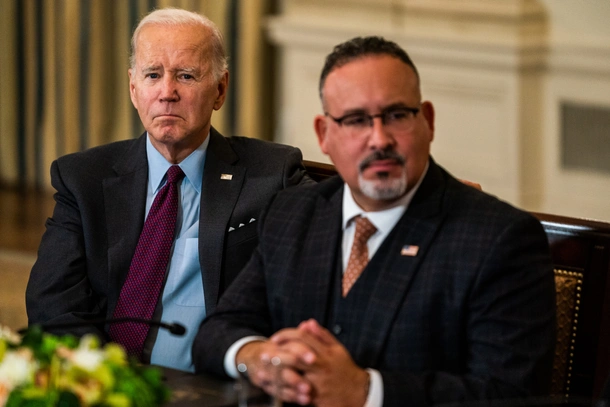Biden Administration Releases Guidelines on Racial Diversity in College Admissions Following Supreme Court Affirmative Action Ruling
The Biden administration has issued new guidelines for higher education institutions regarding the consideration of a student's race during ...

The Biden Administration's New Guidelines for Higher Education Institutions
The Biden administration has issued new guidelines for higher education institutions regarding the consideration of a student's race during the admission process. This comes after the U.S. Supreme Court banned affirmative action. Secretary of Education Miguel Cardona emphasized the urgency of the situation during a press briefing on Monday.
Supreme Court Ruling on Race-Based Admissions Programs
In a landmark ruling, the Supreme Court of the United States (SCOTUS) declared that race-based admissions programs at Harvard University and the University of North Carolina violated federal laws. The court stated that Harvard's program violated Title VI of the Civil Rights Act, while the University of North Carolina's program violated the Equal Protection Clause of the 14th Amendment. This ruling has significant implications for affirmative action policies in higher education institutions across the country.
Lawsuits Against Harvard University and the University of North Carolina
Students for Fair Admissions has filed lawsuits against Harvard University and the University of North Carolina (UNC), alleging that both schools discriminate against Asian-American and white applicants by considering race in their admissions processes. The group argues that Harvard violated Title VI of the Civil Rights Act, which prohibits racial discrimination by federally funded schools. In the case against UNC, the group claims that the university violated the 14th Amendment's equal protection clause. The lawsuits highlight the high test scores of rejected Asian-American and white applicants as evidence of unfair treatment.
Concerns about Banning Affirmative Action
Education Secretary Miguel Cardona expressed concern about the potential consequences of banning affirmative action on a national scale. He referred to past instances where individual states banned affirmative action, resulting in fewer students of color applying and being admitted to colleges. Cardona emphasized the importance of not backpedaling on progress in terms of diversity and inclusion in higher education.
Efforts to Continue Considering Race in Admissions
The Supreme Court's recent decision to eliminate universities' ability to consider race in their admissions processes has significant implications for universities across the country. However, some universities have expressed their intention to find a way around this ruling and continue to consider race in their admissions.
Promoting Diversity and Inclusion in Higher Education
Associate Attorney General Vanita Gupta spoke at a news conference about a recent decision that affects admissions in higher education. Gupta emphasized that while the decision may change the admissions landscape, it should not be a reason to abandon efforts to make institutions more inclusive. She stated that race can still be considered as it can be relevant to a person's life, experiences, development, motivations, academic interests, and personal or professional aspirations. Gupta's remarks highlight the importance of continuing to prioritize diversity and inclusion in higher education.
Guidance for Colleges and Universities
The Department of Education and the Department of Justice have released guidance for colleges and universities on how to promote diversity among their student bodies. The guidance includes information on legal resources and steps that institutions can take to achieve diversity, taking into account factors such as race and ethnicity.
Importance of Fair Admissions Practices
Federal officials have clarified that the recent Supreme Court decision does not mean that institutions should disregard race when identifying potential students for outreach and recruitment. However, it is important that these programs do not give preferential treatment to specific groups during the admissions process.
Potential Changes to College Admissions Policies
Federal officials have provided examples of potential changes to college admissions policies. These include the creation of affinity clubs with race-related themes, taking into account how an applicant's race has influenced their personal experiences, and re-evaluating preferences for students with legacy status or donor affiliation. These changes aim to promote diversity and equity in college admissions.
Ensuring Access to Higher Education for Students from Diverse Backgrounds
The US Department of Justice and the Department of Education have issued a joint letter encouraging colleges and universities to review their admissions policies. The letter suggests that institutions should prioritize attributes such as hard work, achievement, intellectual curiosity, potential, and determination when considering applicants for the upcoming admissions cycle. The aim is to ensure that admissions practices are fair and focus on rewarding the qualities that are most valued by the institutions.
Importance of Higher Education for Equal Opportunity
Attorney General Merrick Garland emphasized the importance of ensuring access to higher education for students from diverse backgrounds. He stated that this is a powerful tool to prepare graduates to lead in a diverse nation and fulfill the promise of equal opportunity for all.
